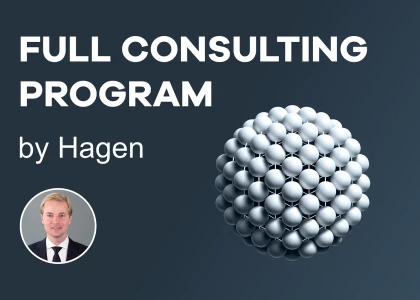I know that it "depends" - yes I 100% get that, but what's the ball park for these?
How much do you ask or usually see get asked? How much is too much?
I know that it "depends" - yes I 100% get that, but what's the ball park for these?
How much do you ask or usually see get asked? How much is too much?


Hi there,
I would be happy to share my thoughts on your question:
You can find more on this topic here: How to succeed in the final interview round.
If you would like a more detailed discussion on how to best prepare your application files, for your upcoming pre-interview assessments and/or interviews, please don't hesitate to contact me directly.
Best,
Hagen

Hi there,
I believe about 5 - 10 if the case is very complex. It may sounds like a lot, but depending on the prompt you really need to deep dive to isolate the scope. You should know what problem you have to solve and what "solve" look like, so the idea is to really understand what you are dealing with and how success will be measured so that you can structure your answer based on the objective in a very crisp and efficient way.
Some questions that usually are useful:
1) What is the client's goal? What is the success metric? (increase profits, reduce churn, etc)
2) Does the client has a target? (e.g.: if the metric is profits, how much or by how much does he wants to grow?)
3) By when? (is there a deadline?)
4) Are there any constraints to be considered? (e.g.: the client is only interested in a particular investment if it has a payback of X)
5) + depending on the context, may be interesting asking WHY the client wants to do something, if there are underlying reasons that one should be aware of (context: enter a market, buy a company, launch a product; potential underlying reasons: respond to a threat, comply with government laws, respond to a market demand, etc.)
Best,
Mari

Hello,
I know this is not what you want to hear, but it's not about the number of questions you ask (this is not a metric tracked by interviewers - it can be very misleading) but what you ask, when, and in what sequence.
Here are some tips to improve at asking questions:
Eventually, if you master these concepts, you will solve a case faster and ask fewer questions.
I hope this helps! We've only scratched the surface here. Please feel free to reach out if you want to test these concepts in a case. I'm offering a buy-1, get-1 session this month, so let me know if you are interested!

Hey Hudson,
Great question—while it does depend on the case and interviewer style, a good ballpark is typically 4 to 6 well-structured, purposeful questions throughout the interview.
The key is to make sure your questions are hypothesis-driven and help you move the case forward, rather than gathering data for the sake of it. Some common types of questions to consider:
If your questions are focused and tied to your structure or line of thinking, you’re unlikely to overdo it. But if you’re asking repeatedly without a clear direction, even a few can feel like too many.
Let me know if you’d like to run through a case together—happy to help with your prep!
Best,
Evelina

hey Hudson!
I normally recommend the following to my coachees:
So overall, I would recommend to ask ~3 targeted questions early, then 1–2 more during analysis
• Less is more if your structure anticipates key drivers
• Too many questions without direction can signal uncertainty — aim for purpose, not volume
Best, Alessa

Hi there,
Normally, you'd hear 3-5 questions.
But yes, as you say, it 'depends'.
The most important thing is to ask questions that generally matter, in the sense that either they help you clarify something or test some emerging hypothesis.
The mistake that most candidates make is asking some questions just for the sake of asking them because they heard it helps.
Best,
Cristian

It very much depends on the amount of info you are given.
In a normal case, somewhere in the range of 3-6 questions. But sometimes, you'll be given very little by the interviewer, and they'll expect you to probe various points of the logic tree. In those cases, you may need to ask more.
The key is to be logical - asking targeted questions which are likely to be material to the case outcome, rather than taking a scatter-gun approach. Be ready to explain the purpose/rationale of your question if asked.

